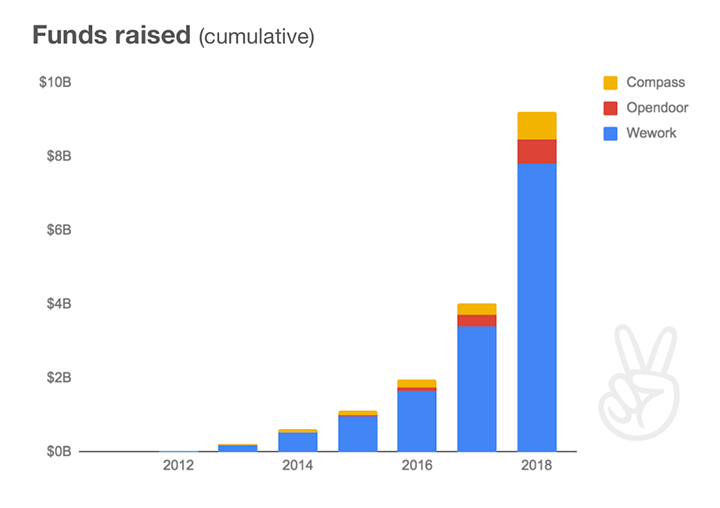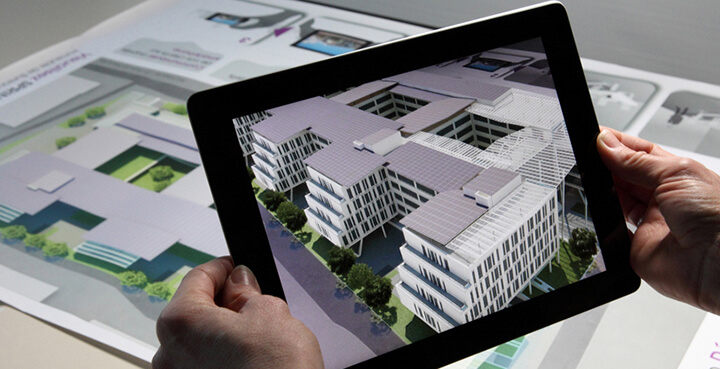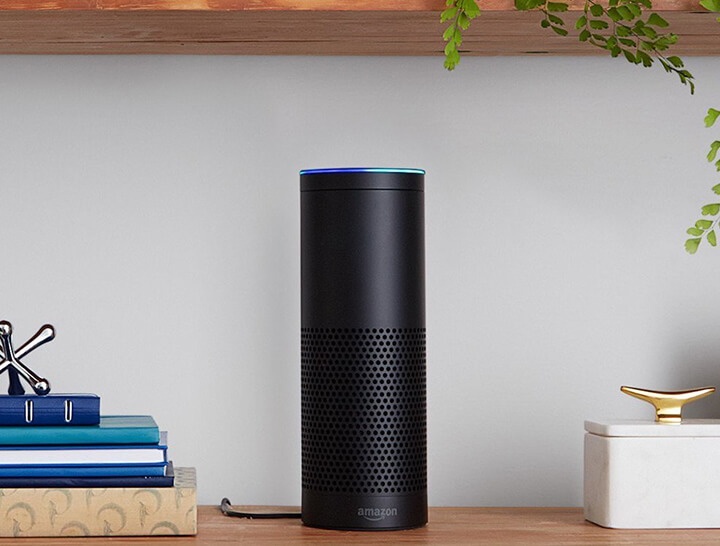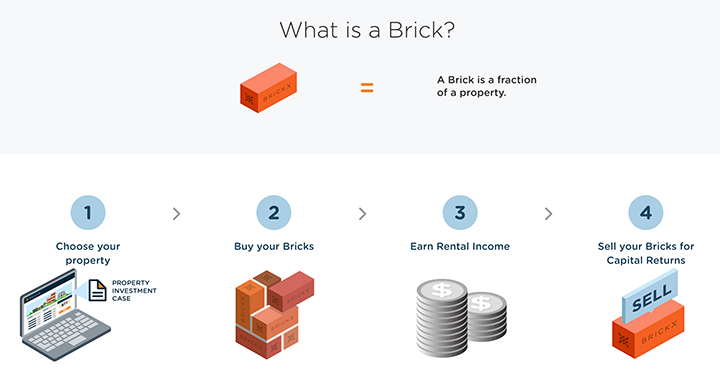May 27th, 2019
The future of the real estate industry
Industry News
Property Management

You wake up in the morning, ask Amazon Alexa for your daily property report and schedule then use your smartphone app to automatically make your bed and get your coffee ready for the day. What a world we live in – technology is constantly evolving and making our lives easier and more efficient.
In a similar vein, real estate tech has been shaped by changing market conditions and consumer behaviours. Without further ado, here are the top 10 real estate tech trends to watch in 2019:

Fuelled by long-term investor confidence created by proptech trailblazers like The We Company, Airbnb, Compass and OpenDoor, global funding of real estate property technology or “proptech” has been rising about 36% year on year. This figure is set to increase with more real-estate focused venture funds entering the market.
This increase in funding has not only paved the way for a new wave of proptech startups but has also accelerated the rate of disruption in the industry. Newer proptech incumbents now have the means to benchmark their potential growth while more established proptech firms now have the capital and confidence to forge into new markets.
In fact, not long ago, Amazon announced that it was getting into the residential real estate game, Facebook expanded its Marketplace with rentals and sales, a few rent-bidding apps launched in Australia and Bloomberg wrote about autonomous vehicles disrupting the real estate industry.
With the world moving at such an alarmingly fast pace, the only thing you can do is be prepared for disruption by fostering a culture of change and continuous improvement. While it’s easy to be complacent and stick to what you know, those who are agile and open to new real estate tech will gain a competitive edge.
In layman’s terms, big data is a large amount of data that’s analysed via algorithms to make predictions about purchase behaviour and intent, based on past patterns, trends and associations. Hence why it’s the lifeblood of companies like Amazon, Facebook, Uber and Netflix. Big data is how Amazon knows what you want, even before you know it yourself.
In the real estate realm, this might mean using a CRM or suite of products that knows when a lead visits your website or listing and collects data on what they’re doing on that page. This data can then be used to help predict when a lead might be ready to purchase or sell their home, how many people might turn up at your next open for inspection or even how much a property would rent or sell for prior to listing it.
In the long run, not only will this help you create more personalised interactions but can also help you win more listings and outperform your competitors.

A few years ago, “the cloud” was seen as a mysterious pocket of the internet that eluded principals and agents alike. Fast forward to now and the cloud is fast becoming the norm and legacy server-based software is quickly becoming obsolete.
This is due to the many benefits of cloud property management software including time and cost savings, scalability, increased security and greater accessibility. Additionally, cloud-based systems like PropertyMe have client access which allow tenants and owners to log in and see their property and financial information 24/7, reducing the amount of communication required.
In fact, according to Forbes, 74% of tech chief financial officers said that cloud computing will have the most measurable impact on their businesses. Have you upgraded to the cloud yet?
Blockchain is the technology behind cryptocurrencies such as Bitcoin, Litecoin and Ethereum. Essentially, it’s a public, digital ledger or database that records all transactions, without the need for a central verifying authority such as a bank. No middleman means reduced legal and title-related costs and a faster settlement process.
Since the end of 2017, the first properties have already been sold using blockchain technology and a number of blockchain real estate companies have emerged. These include Propy (PRO tokens), Propify, RentBerry (BERRY tokens), ShelterZoom and Brickblock. Read more in Everything You Need to Know About Blockchain and Real Estate.

Did you know that virtual reality (VR) has become so accessible that it’s on track to becoming a $29.7 billion dollar industry in 2020?
With VR, potential buyers and renters can virtually tour the property from anywhere in the world, at any time. This means that the property is open for inspection 24/7, allowing agents and clients to save time and money while increasing efficiency and engagement.
Meanwhile augmented reality (AR) apps superimpose a computer-generated image of an object into real life, allowing people to do things like capture Pokemon or virtually decorate a space using their phones or tablets. For brokers and developers, they’ll be able to showcase the potential of an unfinished space using AR to present a desired lifestyle and decrease time on market.
Another real estate tech trend to watch this year is push technology. While this technology has been around for a few years, it has become increasingly popular as more and more agencies develop their own smartphone apps.
Agencies can use push technology to send content alerts to a smartphone’s locked screen and other notification areas in order to get users back on the app again and generate leads (phone calls). According to Kahuna Mobile Marketing, push notifications double retention rates and help prevent app uninstalls.
In addition to that, you can use real estate apps like Homepass to register inspection visitors with a few taps. Thereafter, the app sends push notifications to those leads with further information. This automates part of the follow-up process and improves the overall engagement experience.

The modern consumer expects immediacy. They want answers to their questions and they want them now. That’s where real estate robots like chatbots, voice bots and virtual assistants come in. Not only can they help answer consumer queries with little to no delay to keep consumer expectations at bay, but they can also free up your time to focus on what really matters.
Chatbots such as Holmes, ChatFuel and CRIBZ (targeted toward millennials looking for property) trigger messages based on certain actions or keywords to provide timely assistance. They can be found on popular social media platforms like Facebook and on many websites. In fact, if you’re reading this, it’s likely that you’ve interacted with one before!
Additionally, real estate virtual assistants like Aiva and voice bots like Alexa and Siri can help you simplify your workload. You can ask them to perform tasks such as schedule meetings, create reminders and search the web for property news.

Did you know that over 88% of Australians own a smartphone?
That’s why it’s become the norm for CRMs like Rex and property management software systems like PropertyMe to have a smartphone app so that agents can access their contacts, property data and tools from anywhere, at any time.
This not only saves downtime but also allows easy collaboration from the road. You could be conducting an open home in the morning then driving to an inspection in the afternoon and have everything you need to manage your properties in the palm of your hand. Just check out how this property manager conducted end of month at an open home.
 Image credit: brickx.com
Image credit: brickx.com
Fractional property investment platforms allow investors to buy a portion or “fraction” of a property. These investors collectively “own” the property and can benefit from a share of rental income or capital returns in the event that the property is sold.
A few examples of fractional property investment platforms in Australia include BRICKX, DomaCom and the newly launched CoVESTA. More recently, BRICKX has announced another round of successful funding with NAB Ventures joining Westpac’s Reinventure fund as an investor in the platform.
Automation is another real estate tech trend to watch in 2019. From online chat (cue real estate robots) to social media and emails to property accounting and invoice processing, there are so many real estate tasks that can now be automated.
In order to remain competitive, you need to leverage real estate technology to your advantage to automate predictable communication and administrative tasks such as data processing and collection. This will free you up to further your skills in communication, management and decision making to grow your business.
Thanks for reading this blog on the top real estate tech trends to watch in 2019! Please let us know what real estate tech trend excites you the most and what you’ve implemented in your business. We’d love to hear from you!
You might also be interested in The Future of the Real Estate Industry, 10 Incredibly Useful Tech Tools Every Agent Needs, The Shift Towards Customer Experience in Real Estate and 7 Habits of Highly Successful Property Managers.
Did we miss anything in Top 10 Real Estate Tech Trends to Watch in 2019? Please let us know in the comments below.